In this easy and advanced travel vocabulary lesson for ESL learners, you will learn and practise common expressions used at the airport, train station, hotel, and while asking for directions in real-life conversations.
1. Airport vocabulary
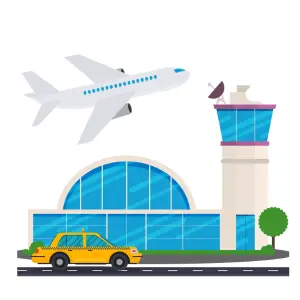
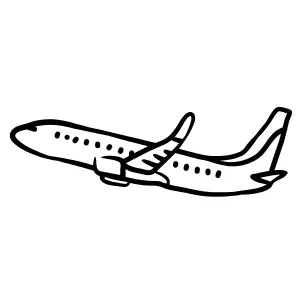
In the UK, people say aeroplane. In the US, people say airplane.
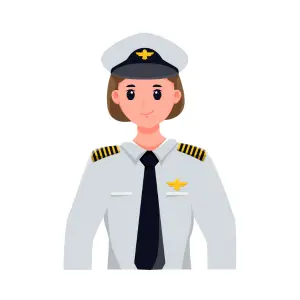
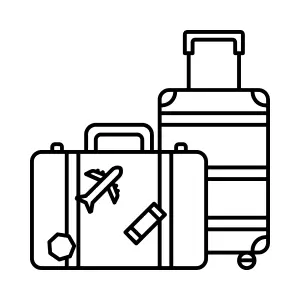
In British English, luggage and baggage describe the suitcases and bags you carry while travelling, including what’s inside. However, luggage is more commonly used.
In American English, luggage usually refers to empty bags, while baggage usually means bags along with everything packed inside.
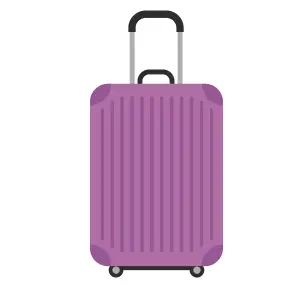
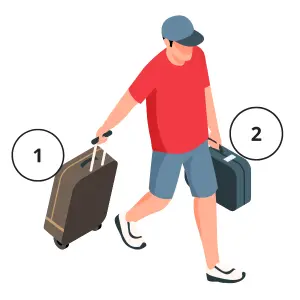
Do you know the difference between a briefcase and a suitcase? Well, a briefcase is smaller than a suitcase. We use a briefcase to carry documents, laptops, office items, etc. However, we use a suitcase for clothes and personal items when we travel.
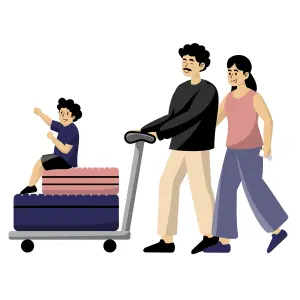
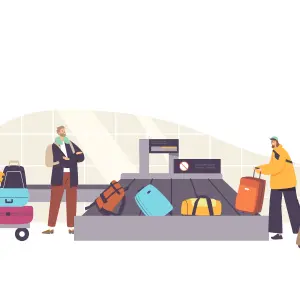
We use trolleys to carry things. We see them at a supermarket (a supermarket trolley) or at the airport (a luggage trolley).
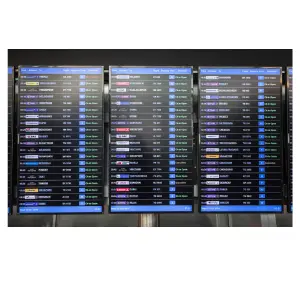

A flight information display board shows passengers their flight numbers, flight schedules, gate numbers, boarding time, baggage claim areas, and flight statuses.
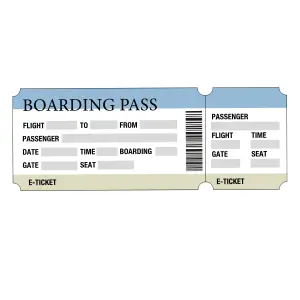
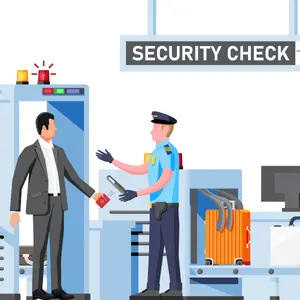
A security check is the process where airport staff make sure that passengers do not carry prohibited items (sharp objects, liquids over 100ml, flammable materials, drugs, weapons) with them.
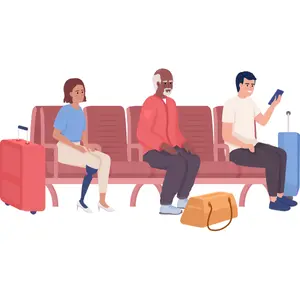
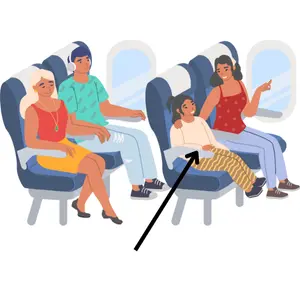
A lounge is a room at the airport where people can relax while waiting for their flight.
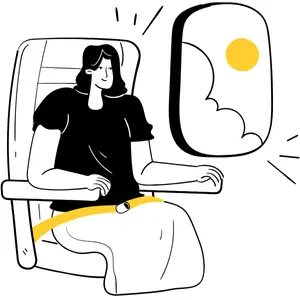
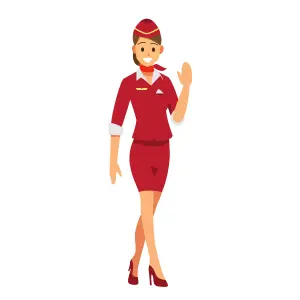
A flight attendant is a member of a commercial airline’s cabin crew who makes sure that passengers are looked after on an aircraft.
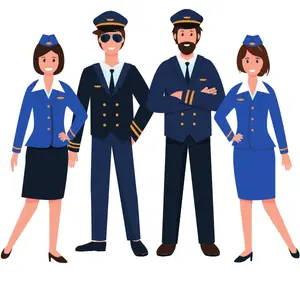
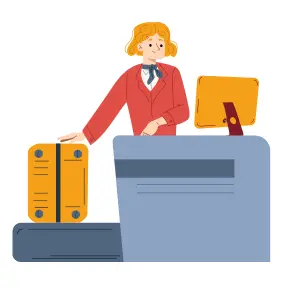
A check-in desk attendant is an airport staff member who checks passengers’ travel documents, weighs and tags their luggage, assigns seats, and prints their boarding passes.
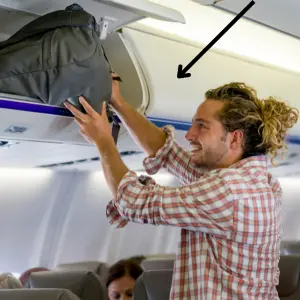
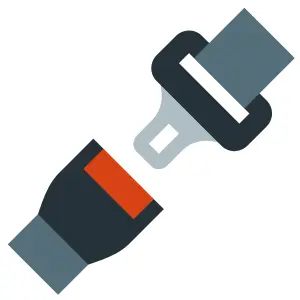
Some people are extremely afraid of flying. This condition is called aerophobia. It affects up to about 5% of people in the UK.
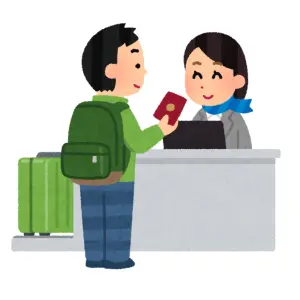
Do you like travelling? What means of transportation do you like the most? How often do you travel? Travelling is one of my favourite hobbies.
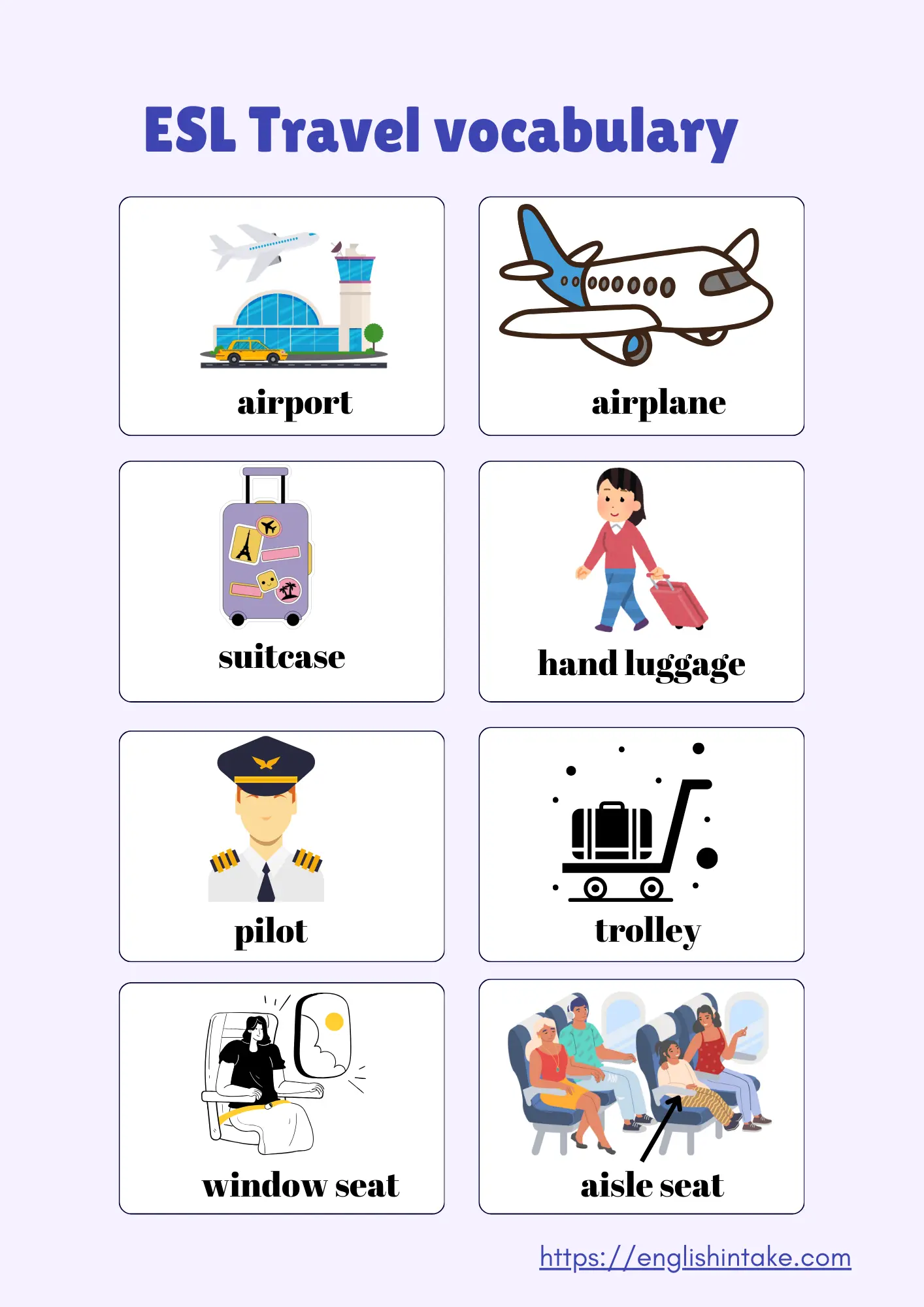
2. Common travel phrases
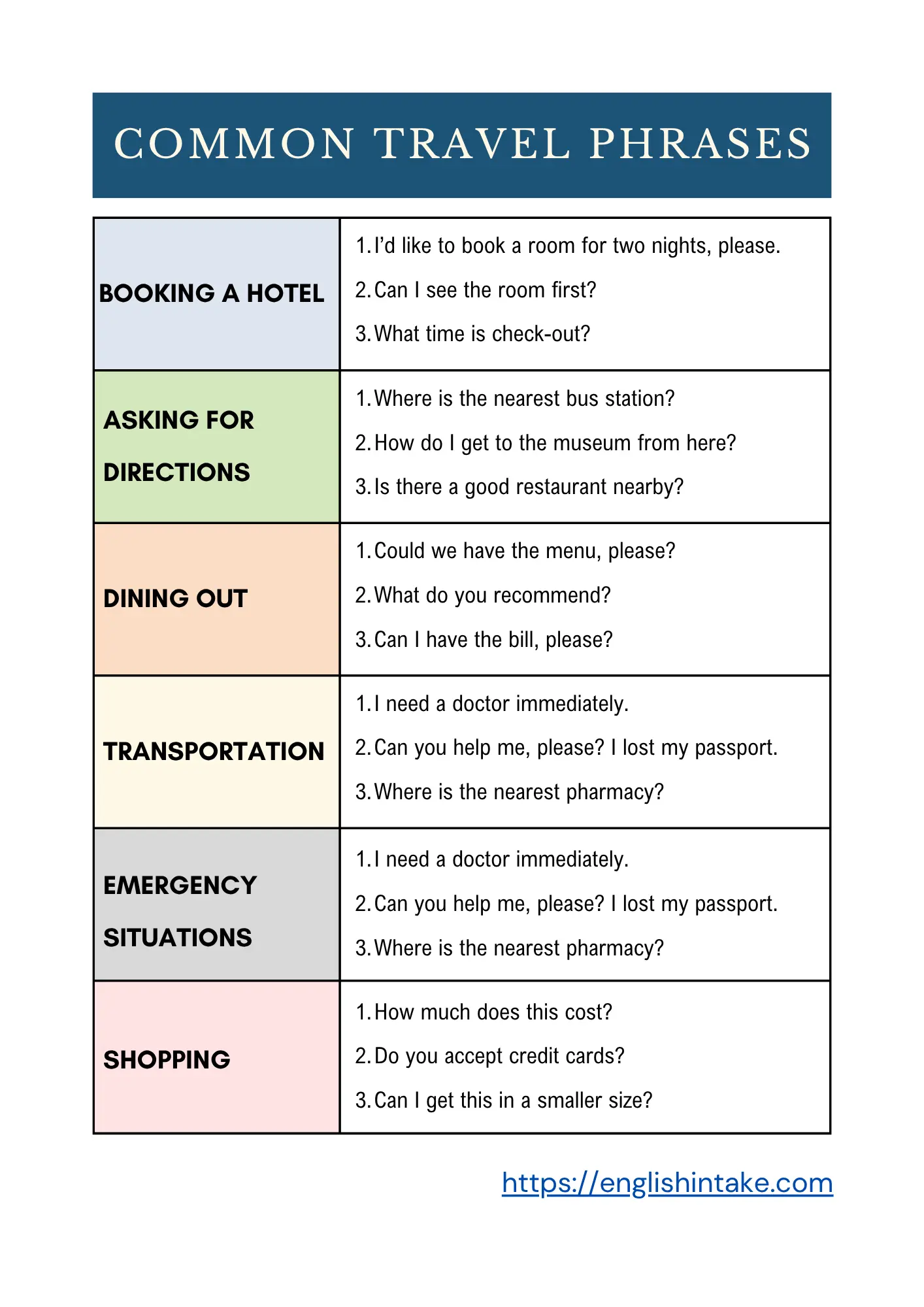

3. Travel preparation
Booking a hotel on the phone
How to book a hotel on the phone?
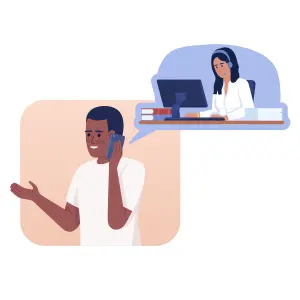
We are on the 15th of June. Mr Mark is travelling to Berlin on the 21st of June. He needs to book a room for two nights. Read the conversation below and try to memorise the booking vocabulary used.
Receptionist: Good morning, sir. How can I assist you?
Mr Mark: Good morning. I’d like to book a double room for two nights, from the 21st of June, please.
Receptionist: Certainly. Let me check the availability for you. (Pause) Yes, we do have a double room available for those dates. Would you like breakfast included with your stay?
Mr Mark: Yes, please.
Receptionist: Perfect. May I ask your name?
Mr Mark: Sure, It’s Mark Smith.
Receptionist: Great. Your booking is secured. The total cost will be 200 €. You can pay it when you check in. Is there anything else you need?
Mr Mark: Is it possible to check in at around 11 am?
Receptionist: I am afraid that might be too early. However, we can securely store your luggage at the hotel if you arrive early. You can also relax in our guest lounge or enjoy a meal at our restaurant while waiting for your room to be available. Does that sound good?
Mr Mark: Yes, that works for me.
Receptionist: Do you have any other requests?
Mr Mark: No, that’s all. Thank you for your assistance. Goodbye!
Receptionist: Goodbye, Mr Mark! We’re looking forward to your stay with us.
| Travel term | Definition |
|---|---|
| Reservation/Booking | An arrangement made in advance to have a place kept for one’s use in the future. |
| Breakfast Included | A term used in hotel bookings to indicate that the cost of the breakfast is included in the room price. |
| Non-refundable | This means that you cannot get your money back if you decide to cancel or change your booking. |
| Check In | When you check in at a hotel, you report your presence and confirm your booking at the hotel’s front desk. This process usually involves providing your identification (like a passport or ID card), verifying your reservation details, and receiving the key to your room. |
| Check Out | To leave a hotel after paying and returning your room key. |
Useful phrases related to hotel booking
- I’d like to make a reservation, please.
- Could I book a room for two nights?
- Do you have any rooms available for next week?
- What’s the rate per night?
- Is breakfast included in the price?
- Could I have a room with a sea view, please?
- Do all the rooms have Wi-Fi?
- I would like to cancel my reservation.
- I would like to change the dates of my stay.
- What time is check-in and check-out?
Check in at a hotel
Mr Mark has just arrived at his hotel after a long road trip. He walks to the front desk to check in and get his room key. Read and listen to the conversation between him and the receptionist.
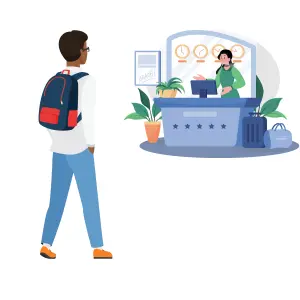
Receptionist: Good morning, sir. How can I help you?
Mr Mark: Good morning. I have a reservation under the name of Mark Smith.
Receptionist: May I please have your ID or passport?
Mr Mark: Sure, here it is.
Receptionist: Thank you, sir. Let me quickly check your booking. (The receptionist checks the reservation system). You’ve booked a double room for two nights. Is that correct?
Mr Mark: Yes, that’s correct.
Receptionist: Perfect, everything is in order. Your room is 315. The elevator is just to your right. Breakfast is served from 7 to 10 am in the dining room on the ground floor.
Mr Mark: Thank you. What’s the Wi-Fi username and password?
Receptionist: You will find the login details at the back of the key card.
Mr Mark: Great, thank you.
Receptionist: My pleasure, sir. Enjoy your stay with us. If you need anything, don’t hesitate to call the front desk.
Mr Mark: Will do. Thank you.
Buying a ticket
Mr Brown is in Germany. He is currently in Mannheim and is going to Hamburg by train in the next few hours. He is buying a ticket at a ticket counter. Read and listen to the conversation between him and the ticket agent.
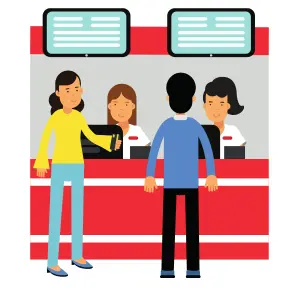
Ticket agent: Good morning, how can I assist you today?
Mr Brown: Good morning. I’d like to purchase a ticket to Hamburg, please.
Ticket agent: Certainly, sir. Would you like a one-way or a return ticket?
Mr Brown: I would like a one-way ticket.
Ticket agent: May I know your intended departure time, please?
Mr Brown: I’m planning to leave about two to three hours from now.
Ticket agent: Just a moment, please. (The ticket agent checks the system to look at the schedule). Yes, there is a train at 3 pm. The next one departs at 6 pm.
Mr Brown: I’d like to take the one at 3 pm, please.
Ticket agent: A second-class ticket costs 100 € for a flexible ticket and 80 € for a restricted ticket. A first-class ticket costs 130 € and it’s flexible.
Mr Brown: Excuse me, what is the difference between the flexible and the restricted ticket?
Ticket agent: The flexible ticket allows you to make a date and time change without any fee. You can also cancel your trip and get a full refund. However, the restricted ticket is non-refundable and you cannot change the time and date of your travel.
Mr Brown: Thank you. I’ll take the second-class flexible ticket, please.
Ticket agent: Perfect. How would you like to pay, sir?
Mr Brown: I’ll pay by card.
Ticket agent: Perfect. (The ticket agent processes the payment) Here is your ticket, Mr Brown. Please be at the platform at least 15 minutes before departure.
Mr Brown: Thank you for your help.
Ticket agent: You’re welcome. Have a wonderful trip!
Mr Brown: Thank you. Goodbye!
Ticket agent: Goodbye!
4. Example conversation at the airport check-in desk
Mr Mark is at the airport. He is queueing to check in his luggage at the check-in desk. When it’s finally his turn, he steps forward to proceed with the check-in procedures. Read the conversation between Mark and the check-in attendant.
Check-in attendant: Good morning, sir. May I have your passport, please?
Mr Mark: Sure, here it is.
Check-in attendant: Thank you, sir. (The check-in attendant checks the details). Would you prefer an aisle seat or a window seat?
Mr Mark: A window seat, please.
Check-in attendant: Do you have any luggage to check in?
Mr Mark: Yes, I do. I have two suitcases to check in and a carry-on bag.
Check-in attendant: Please put your bag on the luggage belt.
Mr Mark: (Mr Mark puts the luggage for weighting).
Check-in attendant: Did you pack your luggage yourself?
Mr Mark: Yes, I did.
Check-in attendant: Are there any flammable items, batteries, cameras, jewellery, or any other restricted items in your luggage?
Mr Mark: No, there aren’t.
Check-in attendant: Please put the other luggage in the luggage belt.
Mr Mark: (Mr Mark puts the other luggage for weighting).
Check-in attendant: You will get your luggage at your final destination. Here is your boarding pass. The boarding begins at 10:30 am, and the gate closes 20 minutes before departure.
Mr Mark: Thank you so much. Could you tell me where the airport lounge is?
Check-in attendant: Absolutely, once you’re through security, just turn left and follow the signs. The lounge is located past the duty-free shops.
Mr Mark: Thank you. Have a nice day!
Check-in attendant: You too. Enjoy your flight.
